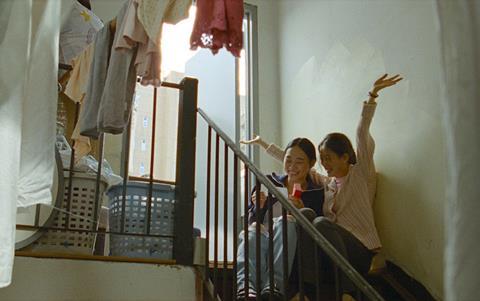‘Superb’ Critics Week debut explores the precariousness of New York’s Chinese community

Dir/scr: Constance Tsang. US. 2024. 117mins
An accidental romantic triangle is the centrepiece of Chinese-American writer-director Constance Tsang’s observant, lovely feature debut. Blue Sun Palace concerns best friends living in New York’s Chinese community who separately get involved with the same married man. But this sensitive drama — which is punctuated by a shocking act early on — is more concerned with how immigrants navigate the feeling of being perpetual outsiders. All three performances are deceptively muted, as Tsang’s quietly revelatory scenes hint at the layers of loneliness and despair within her characters.
Tsang explores how the marginalised form their own family units
Blue Sun Palace premieres in Cannes Critics’ Week, a launching pad that will introduce audiences to a filmmaker with a gift for melancholy atmosphere. Golden Horse winner (and Tsai Ming-liang regular) Lee Kang Sheng leads a fine cast that includes Wu Ke-xi and Xi Hai-peng, and strong reviews could lead to further festival engagements and an arthouse theatrical run.
Inspired by the death of her father when she was a teenager, Tsang sets her story in Flushing, Queens, where she lived at the time. Didi (Xu) and Amy (Wu) are roommates who both work at the same rundown massage parlour. (A sign on the front door warns customers ’No sexual services’ but, as we will discover, that rule is not always enforced.) These close friends are seeking more fulfilling lives, with Didi excited about her new relationship with Cheung (Lee), an older man who has a wife and child living in Taiwan. But, after a tragic incident, the story turns its focus away from Didi to Amy, who suddenly finds herself being courted by Cheung.
Cinematographer Norm Li gives this working-class milieu a grubby, lived-in realism as Didi and Amy make the best of difficult lives in which they find little joy outside of their friendship. Tsang incorporates several impressive but unfussy single-take scenes that emphasise the casual intimacy between the characters, starting with an opening sequence between Didi and Cheung at a restaurant, the flirty spark between them apparent. Despite Cheung being married, Didi can imagine a future with him, which seems to be where this skeletal narrative is heading. Then comes the plot twist.
Tsang, whose short films include Beau and Carnivore, touches on grief and displacement in Blue Sun Palace, illustrating how precarious this Chinese community is. Indeed, this unexpected tragedy will upend these individuals, and the rest of the film finds them reacting in different ways. Some want to cling more tightly to the community as a result, while others want to escape and start new lives elsewhere. Tsang explores how the marginalised form their own family units when the outside world wants nothing to do with them.
To that point, Didi, Amy and Cheung have each learned how to blend in, disappear, speaking Mandarin to build a safe barrier between themselves and the racist Americans who surround them. (Different kinds of violence visit this immigrant community, whether via a gun or an especially belligerent massage customer.) The film’s hushed tone echoes the characters’ silent desperation, and Wu is especially luminous as a shy young woman who feels extremely conflicted by the sudden turn of events.
The film’s sympathetic approach ensures that none of the main characters is judged too harshly. This is especially crucial with Cheung, who Lee plays as a soulful charmer who, nonetheless, has a habit of letting his romantic urges overrule his sense of decency. But the veteran actor’s burdened expressions suggest a man who has constantly searched for a contentment just out of reach, his past mistakes as close as the angry calls he receives from his wife, who expects him to send her money from his unsatisfying job in construction. Each of the three leads in Blue Sun Palace dreams of a transcendence that may never come — Tsang’s superb debut puts viewers on their side, even though we see how long the odds are against them.
Production companies: Big Buddha Pictures, Field Trip Media
International sales: Charades, carole@charades.eu / US sales: WME, jrabb@wmeagency.com
Producers: Sally Sujin Oh, Eli Raskin, Tony Yang
Cinematography: Norm Li
Production design: Evaline Wu Huang
Editing: Caitlin Carr
Music: Sami Jano
Main cast: Wu Ke-xi, Lee Kang Sheng, Xu Haixpeng







![The Brightest SunScreen[Courtesy HKIFF]](https://d1nslcd7m2225b.cloudfront.net/Pictures/274x183/3/5/0/1448350_thebrightestsunscreencourtesyhkiff_312678.jpg)













